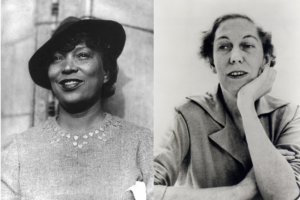Lecture Date: March 4, 2021
The Dovetail Cultural Resource Group Lecture

The US South is a region rich in outstanding literary women, with Harriet Jacobs, Mary Chesnut, Kate Chopin, Margaret Mitchell, Carson McCullers, Flannery O’Connor, Harper Lee, and Alice Walker, among others, coming to mind. However, two twentieth-century southern women writers often tower above the rest: Zora Neale Hurston and Eudora Welty.
Born in 1891 in Alabama but primarily the product of the all-Black town on Eatonville, Florida where she grew up, Hurston boldly burst onto the literary scene of the Harlem Renaissance in the 1920s with her short stories. However, lasting fame came from her four novels, including the beloved Their Eyes Were Watching God (1937).
Born in 1909 in Jackson, Mississippi, which remained her home throughout her life, Welty is a celebrated short story writer of works like "Why I Live at the P.O.," "A Worn Path," and the stories in the cycle The Golden Apples, but her magnificent novels include a wide range, with her final one, The Optimist's Daughter (1972), an exploration of grief at the loss of a parent, winning the 1973 Pulitzer Prize.
Gary Richards puts these two fascinating writers in dialogue with one another to explore their handling of race and gender while simultaneously exceeding traditional literary boundaries, Hurston with her anthropological studies and Welty with her photography.
For further reading on Zora Neale Hurston and Eudora Welty, see an op-ed by Gary Richards, published in the Free Lance-Star.
Speaker: Gary Richards

Gary Richards is Professor of English and Chair of the Department of English and Linguistics at the University of Mary Washington. An expert in southern literature, US fiction and drama, and gender, race, and sexuality studies, he earned a Ph.D. from Vanderbilt University and is the author of Lovers and Beloveds: Sexual Otherness in Southern Fiction, 1936-1961 (2005) as well as numerous essays and book chapters on a range of US writers, including William Faulkner, Tennessee Williams, Eudora Welty, Alfred Uhry, Beth Henley, and Harper Lee.